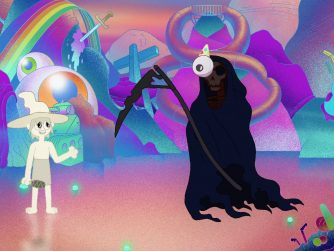Perspective.
A point of view. A choice of opinion in a certain context. Life is shrouded in varying perspectives. In a more specific tone, the character of the joker is all about perspective. His origin is quite simply, multiple choice. The ambiguity adds to the mystique of the aura around the menacing character. The joker is almost too daunting in the comics to imagine a backstory for. However, that is exactly what we got in the Todd Phillip’s directed movie, “Joker”. The movie has amassed critical acclaim by all for its bold use of conjecture and its ubiquitous feeling of unsettlement. The movie depicts a very lucid image of Arthur’s descent into insanity and presents quite an apropos image of mental health in modern society. Joaquin Phoenix brings colour with all shades of darkness to the eponymous character, raking in applause from all directions for his brilliant acting in the film. With that said, the movie is riddled with questions. Questions only answerable through introspection, which proliferates the inquisitiveness. Let’s discuss various aspects of the movie and try to figure out how they all connect together to give us a truly remarkable piece of cinema that is “Joker”.
Affluent v Impoverished

The movie presents Gotham at the brink of collapse. Financial disparity is at its peak and lawlessness is at an all-time high. Arthur is the embodiment of the situation in Gotham at the time. The top one percent have no pity for the rest and offer no compassion. Thomas Wayne, who is running for Mayor, seems to refer to the downtrodden as “clowns”. Quite poetic as the oppressed attempt to revolt against the affluent through the imagery of clowns. However, Arthur started off as a lawful man. Although disregarded by society, the man works lawfully for his wages. Despite being brutally attacked on the job in the opening scenes of the film, he subdues his indignation. The thought of possessing a firearm petrifies him. Despite being a lawful citizen of Gotham, there is no remorse shown towards him by anybody. Thomas Wayne referring to citizens of his ilk as clowns must be infuriating. There is such a lack of understanding between the two ends of the spectrum. However, despite being dealt one bad hand after another, Arthur puts on a happy face and does his job. The lack of empathy from the wealthy towards the less fortunate creates resentment, a different ideology.
At the Murray Franklin show, when Arthur confesses to the murdering of the 3 Wayne Enterprise employees so proudly and eventually, violently stands up to the regime by shooting Murray Franklin right in the middle of the show, Arthur triggers a chain of anarchy. He immediately becomes the voice of the voiceless. He becomes the symbol of Justice for the less fortunate. He becomes the face of a movement. On the other side of the coin, Murray Franklin took the brunt of the frustration, but it’s Thomas Wayne at the helm. He has nothing but scorn for the so-called “clowns” of society. And through his ideology, he has amassed a following of his own, people who look at him as the symbol of Justice. Of righteousness. Of power. Of leadership.
Arthur, a kind-hearted man for the majority of his life, wanting nothing more than a place in society on one side. Thomas Wayne, a wealthy brute with no respect or empathy for the underprivileged on the other. How poetic that the two ends of the spectrum are represented by men who, truly, depict contrasting signs.
Ties of Blood

The sanctity of a relationship between a mother and her son has been beautifully captured in the film between Arthur and Penny Fleck, with its obvious kinks. Despite being inundated with trouble, he’s surprisingly normal with his mother. A caring, nurturing side takes over. It’s almost like a respite from normal life. A fleeting moment of normality. But as we continue, we see signs of resentment that Arthur develops towards his mother, almost becoming a burden over the predicaments he was already bogged down with.
Arthur lacked a father figure in his life, for him, it was Thomas Wayne and Murray Franklin. Arthur imagines himself on Murray’s show, picturing a scenario where he is applauded for being a doting son, even going as far as being brought to the stage by Murray who hugs him, depicting the longing he has for a father figure or just plain acceptance.
Things start going awry as Arthur ends up reading one of the letters his mother asks him to post, revealing to him that Penny pleaded Thomas Wayne, his supposed father, to take care of his son. The revelation sends Arthur into a fit of rage and an eventual chain of events that bring nothing but frustration, further fuelling Arthur’s belligerence as he’s losing his grip with the tethers to reality. The questions kept coming. However, Arthur did not care for the answers. As Penny rests in hospital after suffering a stroke, it all becomes clear to him. It suddenly made sense. It made sense in the form of absolutely no sense. And with a sudden snap, Arthur ends up murdering his mother in cold blood. From then on, the causality goes out of the window. It’s just effect, a chain of violence and anarchy.
Looking back, Arthur still didn’t know the truth. Thomas Wayne could easily have fabricated those documents. After all, he does find a photograph of a young Penny with “Love your smile — TW” written on the back. His mother certainly had mental issues. For her, all she did was take care of her son. Cared for him. Hid the truth from him, but for his benefit. For her, he was always happy. On the flip side of the coin is Arthur, who loses all ties to reality after having the foundation of his life absolutely shattered. This was the straw that broke the camel’s back. Who even was Arthur? He didn’t know. And the first victim to his descent into madness was his mother.
Tragedy v Comedy

“I used to think that my life was a tragedy, but now I realize, it’s a comedy”
The chilling words that Arthur spoke before murdering his mother ring in our minds long after the credits roll. Arthur is a clown and an aspiring stand-up comic. The catch is, he is not funny. We find out early on that Arthur suffers from a condition. A condition that leads to uncontrollable laughter under duress. In addition to that, Arthur finds humour in the darkest of situations. His humour is so different from the ordinary person. At comedy shows, he would laugh at the most arbitrary moments. When he did stand-up for the first time, the stress took over. Sending him into a fit of laughter. The laughter had nothing to do with comedy. His stand-up was shown on the Murray Franklin show. His routine wasn’t the joke, he was the joke. It was the moment where he lost a father figure. A man he looked up to. Someone who he aspired to be like. Even his mother, who cared for him, couldn’t help but question her son’s stand-up capabilities by saying “Don’t you have to be funny to be a comedian?” His mother calls him happy. For her, he had been happy his entire life, contrary to what Arthur thinks. As he loses grip with reality, he realizes that he had never been happy for a second in his life. Arthur died the day he murdered his mother. From then on, the joker reigned supreme. His humour was different. He had lived a dark and gloomy life. He didn’t know what comedy was. All he knew was what he found funny. And now, he wants the world to know about his humour.
It all comes together brilliantly as he is invited on to Murray’s show, presumably to be made fun of. Arthur was fully aware of that. His confidence levels at an all-time high. Despite being ridiculed subtly on stage, Arthur tells a very poignant statement, involving a “knock-knock” joke, originally designed to be a set up for him shooting himself on stage before nixing the plan after Murray continued to ridicule him. Arthur makes a joke about the police informing a family of a death, bellowing out into laughter while everyone sits in stunned silence. However, the joker did not care. It was his humor. It was a product of his surroundings. It was him. And it was him owning up to it. To everyone, it was unfathomable to think that something so terrifying could be funny to someone. But that is the point.
Arthur was forced to conform to a society that rejected him. There was no place for a person of his ilk. What he found funny would never be funny to anyone else. The only difference was, he had a voice now. An identity. For him, tragedy and comedy blended into one. An eerie perspective on his psyche and an almost apropos explanation to the joker.
Imagination v Reality

The perception of imagination surpasses the film. Joaquin Phoenix’s Joker has no narrative ties to the original source material. However, the imagery from the comic books has been captured well in certain aspects of the film. The cold-blooded murder of Bruce Wayne’s parents outside the theater, complete with Martha’s pearls scattered on the concrete, with Bruce looking over them in the epilogue. Most important of all, the actual discrepancy between the Jokers origin in the film itself.
We see Arthur begrudgingly walk up the steps, a metaphor for his battle with clinging on to sanity which ultimately ends with him, dancing down the steps in a mesmerizing fashion, depicting his descent into madness. Now, what transpires in the middle is all up for question. In fact, for all we know, the only real aspect of the movie might be the epilogue. Where he might have told the story to his psychiatrist at Arkham, the same lady who was his psychiatrist in Gotham this time, more put together. Arthur laughs, as he imagines Bruce Wayne, probably on the precipice of finding his calling, almost as if that was the punch line itself.
However, during the film itself, the line between reality and fiction keep getting blurrier by the second. His mother’s psychosis prevented her from being completely honest with her son, compulsively lying to him about everything.
The most obvious signs of his loose grip on reality are his interactions with a single mother living next door, Sophie. After their first interaction in the elevator, Arthur becomes obsessed with the lady. His interactions with her seem abnormal for a person of Arthur’s milieu. He becomes almost charming when he’s with her. A sane human being. She accompanies him for this first stand up show. She was with him when his mother was bedridden in the hospital. However, as it became apparent soon enough, it was all Arthur’s imagination. It was the first clear-cut sign of Arthur’s severance with reality, however, that is not it. The Jokers appearance on the Murray Franklin show was the beginning of the revolt against the rich and wealthy by the downtrodden. It gave Arthur an identity. Acceptance by people who suffer just like him. It’s within the realms of plausibility to think that this was another figment of Arthur’s imagination.
Going back, from the start where he holds a smile on his face to the end where he dances mesmerizingly on top of a run-down police vehicle while the city burns in anarchy due to his actions. What did it all lead to?
Him having an identity. And that’s all he ever wanted. To have a place in a society that had long forgotten about him. It isn’t unfathomable to think it’s all in Arthur’s head. For all we know, the origin of the joker could be the final five minutes of the film.
And with that, come unanswered questions. Different viewpoints to the origins of the joker. Exactly what the comic book adheres to.
The most chilling words of the movie were “You wouldn’t get it.” Maybe we won’t.
Right v Wrong

“What do you get when you cross a mentally ill loner with a society that abandons him and treats him like trash? I’ll tell you what you get. You get what you [expletive] deserve.”
Arthur says as he guns down Murray Franklin in an act of defiance against the authoritarian society. Panic reigns in the studio as Joker sits there. No remorse on his face, just a smirk of satisfaction.
And as this happens, we as an audience, feel in our hearts like justice has been served.
The joker is an evil character. He is the evil aspect of this thing so many of us suffer from in our modern society. The character is such a perfect conundrum between right and wrong. There is purity in Arthur’s heart. He longs for happiness, for acceptance, for justice. He had no intention of hurting Gary after brutally murdering Randall in his apartment. Arthur is forced to conform to a society that has rejected him.
“You wouldn’t get it.” Maybe we won’t. Maybe that’s how life keeps going. With selective ignorance, something Arthur was incapable of achieving. Arthur laughs at the face of pure horror. What is horror to him? What is humour? What is justice? What are labels to a man that doesn’t have an identity? Arthur did find an identity though. Even though he says he doesn’t want to start a movement and he murdered the three Wayne Enterprise employees in self-defence and because “they deserved it”, that is exactly what he did and in that, he finds his identity. He finds it through people like him rising up, donning the joker as their emblem. A symbol of Justice to some, symbol of horror for others.
Perspective.
As Arthur proudly takes credit for killing three people, society immediately lambasts him. An outrage ensues. However, would there have been an uproar if they were “scum of the city” like him?” As the joker says, “If it was me dying on the sidewalk, you’d walk right over me.”
Picture this. You are among the audience at the Murray Franklin show. As Arthur confesses to the murder, would you join the outrage or would you question the situation? Would you want to know the reasoning? Would you even care? Is there justification for the society we live in? Do we not live in ignorance? Is that even a bad thing? So many questions. The answers, just like Arthur’s jokes, are subjective. The purpose of the movie wasn’t to provide answers to questions, but it was to provide the right ones.
Is there even a right or wrong when it comes to such a subjective society?
“Joker” is a marvelous piece of cinema, inundated with cold truths, harsh extremism and utter nihilism. The questions the film triggers will hold its place in our mind long after the credits roll.
(Reposted from Rogue Opinions)





